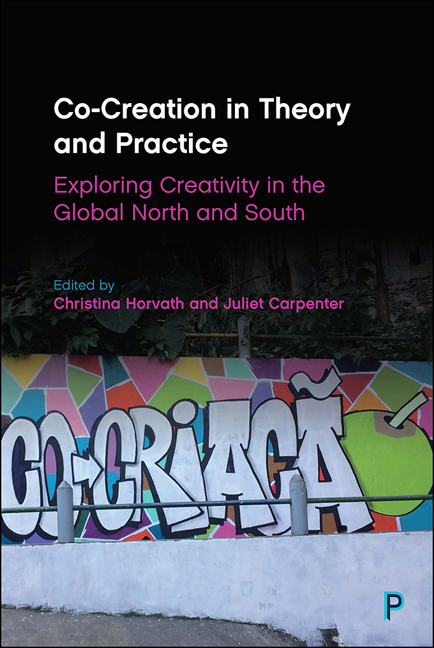18 - Conclusion: Lessons, Implications and Recommendations
Published online by Cambridge University Press: 18 March 2021
Summary
This volume has approached Co-Creation from a variety of different disciplinary angles (planning, political theory, philosophy and literature to name but a few), reflecting the different positionalities of researchers, activists, practitioners and artists from the Global North and South who have contributed to the chapters. It has revealed the hybrid character of the roles that actors can hold and raised further questions about Co-Creation strategies. From their multiple viewpoints, authors have explored the possible aims, outcomes and impacts of Co-Creation, the spaces in which it unfolds and the complex power relations involved in the process.
This concluding chapter will reflect on their contributions, seeking to identify key themes and draw out comparisons between the chapters in order to understand the evolving concept of Co-Creation. It will also highlight emerging directions for further research and formulate some recommendations for activists, researchers, artists, and practitioners interested in pursuing Co-Creation initiatives.
The aims of Co-Creation
The broad scope of areas covered in this volume – ranging from community engagement, civil participation and knowledge production to political activism and advocacy – have raised very different and sometimes contradictory expectations in relation to Co-Creation. Some authors limited Co-Creation's aims to sparking dialogue between individuals, groups and institutions, building or engaging communities, bringing art closer to the underprivileged, awakening civil imagination, and constructing alternative understandings of neighbourhoods and their challenges. Others went further in their claims for transformative change, suggesting that Co-Creation should seek to advance social justice either indirectly, by disrupting traditional thinking and hierarchies and decolonising knowledge production, or directly, by mediating between communities and power holders, balancing interests, and advocating for alternative visions to be incorporated into future policies supported by the state.
These differences raise questions about whether Co-Creation is an actual method or rather an umbrella concept under which very different aims can be brought together and, indeed, whether it has to fulfil all these aims in every particular case in which it intervenes. While one aim of this volume was to address the distinction between ‘co-creation’ as citizen participation in public policies and Co-Creation, reconceptualised as an arts-based knowledge process acting on the external image and self-perception of disadvantaged communities to promote equality through creativity, the two sets of meanings proved resistant to such separation.
- Type
- Chapter
- Information
- Co-Creation in Theory and PracticeExploring Creativity in the Global North and South, pp. 291 - 298Publisher: Bristol University PressPrint publication year: 2020

